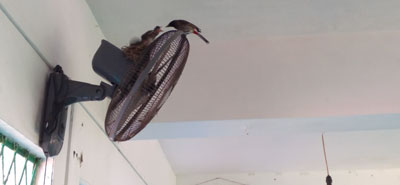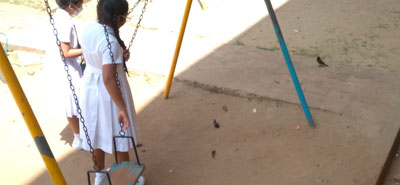News
If you see a fluffy ball of feathers fallen somewhere, give it some TLC
View(s):By Malaka Rodrigo
The little girls were excited as this was the first time they had had such a close encounter with bird fledglings. Though the children did not do any harm, the baby birds who were trying to take their first flight got agitated and tried to fly away. One managed to fly to a nearby tree, but the other whose flight feathers were not so strong hid under a cupboard getting separated from the family.

The parent bulbul feeds its young in the classroom
However, Later in the day, the happy family with the two little ones were seen together in the school garden. The one that that was still finding it difficult to fly was seen getting a helping hand from its parents. “The bird was more cuddlesome than any of my toys, and I’m happy that it found its parents,” said an excited schoolgirl Dulithi Nethumsa.
The birds that were nesting in the Sujatha Vidyalaya 5-A class were the common Red-vented Bulbul (Pycnonotus cafer) or ‘konda kurulla’. They usually build nests inside buildings, away from predators like hawks, snakes, monkeys etc that prey on eggs and fledglings.
Though these baby birds were lucky, there are many young birds who get lost or fall from nests, especially during this peak breeding season of many common garden birds.
“These days we find many baby birds — red-vented bulbul, brown-headed barbet, and the spotted dove being the most common,” says Dr.Suhada Jayawardane, a veterinary surgeon of the Department of Wildlife Conservation’s animal rehabilitation facility at Atthidiya.
According to the bird guide, ‘Sirilaka Kurullo’ by Prof.Sarath Kotagama, yellow-billed babbler (demalichcha), oriental magpie-robin (polkichcha), white-bellied drongo (kawda), brown-headed barbet (polos kottoruwa), long-billed sunbird (sutikka), mynah, greater coucal (ati kukula), collard scops owl (karapati kan bassa), white-throated kingfisher (pilihuduwa), tailor bird (battichcha) are some of the common garden birds that breed during this time of the year.
“If one finds a baby bird that has fallen the best thing to do is to place it on a nest or keep it in a nearby location so that it can reunite it with its parents,” says Prof.Kotagama. It is important to keep a watch on the bird from a distance to protect it from predators, the ornithologist says.
If the lost bird is unable to reunite with its parents then it needs care. If the bird looks weak, then the first thing to do is try to rehydrate it with an oral rehydration liquid such as ‘jeevani’,” says Dr.Jayawardena.

The baby bird lands close to the schoolgirls who were playing while mother bird keeps a watchful gaze Pic by Malaka Rodrigo
Rukmal Rathnayake, a biologist who is involved in the rehabilitation of animals says it is also important to try to identify the bird species as different birds have different kinds of diets. For example, the Oriole feeds mainly on worms while barbets mainly have a fruit diet. But the babbler can be omnivorous. ‘Samaposha’ mixed with water is a good supplement for omnivorous as well as frugivorous birds. The mealworms available as aquarium food, egg, or smashed beef, mixed with water can also be given to insectivorous or predatory birds, Mr. Rathnayake told the SundayTimes. If the bird is too small, use a syringe to feed it, the expert says.
It is not easy to identify the species especially if the fledglings are just a few days old. However observing the beak curves or the patterns of the claws can be useful to identify the species and experts are available to give guidance on social media. “However, you should not feed milk to the bird,” Mr.Rathnayake emphasised.
Since the nights maybe too cold for lost little birds it would be a good idea to put a light bulb into the enclosure where the little bird is being kept, Dr.Jayawardane said.
The best way to say that you found the home of your dreams is by finding it on Hitad.lk. We have listings for apartments for sale or rent in Sri Lanka, no matter what locale you're looking for! Whether you live in Colombo, Galle, Kandy, Matara, Jaffna and more - we've got them all!

